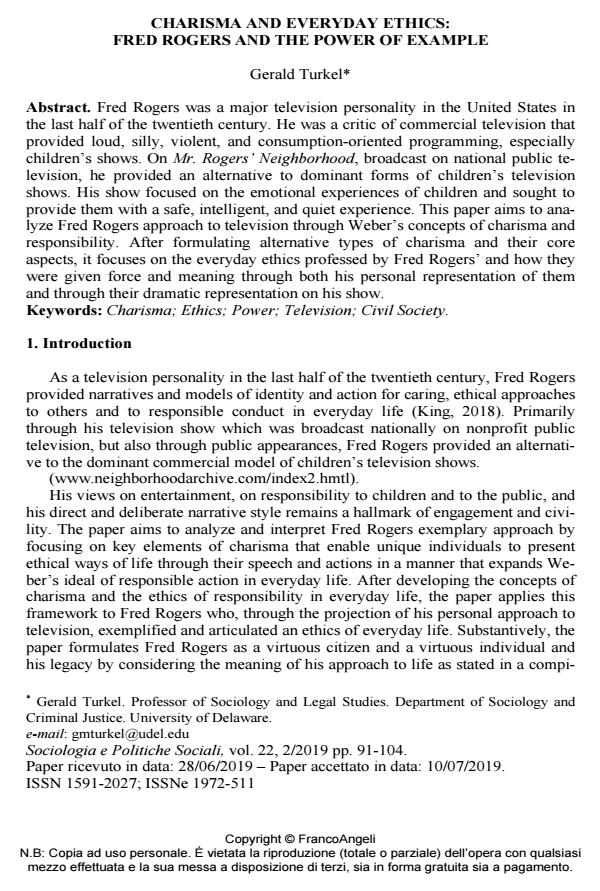Charisma and everyday ethics: Fred Rogers and the power of example
Journal title SOCIOLOGIA E POLITICHE SOCIALI
Author/s Gerald Turkel
Publishing Year 2019 Issue 2019/2
Language Italian Pages 14 P. 91-104 File size 209 KB
DOI 10.3280/SP2019-002006
DOI is like a bar code for intellectual property: to have more infomation
click here
Below, you can see the article first page
If you want to buy this article in PDF format, you can do it, following the instructions to buy download credits

FrancoAngeli is member of Publishers International Linking Association, Inc (PILA), a not-for-profit association which run the CrossRef service enabling links to and from online scholarly content.
Fred Rogers was a major television personality in the United States in the last half of the twentieth century. He was a critic of commercial television that provided loud, silly, violent, and consumption-oriented programming, especially children’s shows. On Mr. Rogers’ Neighborhood, broadcast on national public television, he provided an alternative to dominant forms of children’s television shows. His show focused on the emotional experiences of children and sought to provide them with a safe, intelligent, and quiet experience. This paper aims to analyze Fred Rogers approach to television through Weber’s concepts of charisma and responsibility. After formulating alternative types of charisma and their core aspects, it focuses on the everyday ethics professed by Fred Rogers’ and how they were given force and meaning through both his personal representation of them and through their dramatic representation on his show.
Keywords: Charisma; Ethics; Power; Television; Civil Society.
- Black, D. A. 1999. Law in Film: Resonance and Repression. University of Illinois Press.
- Habermas, J. 1973. Legitimation Crisis. Boston: Beacon Press.
- King, M. 2018. The Good Neighbor: The Life and Work of Fred Rogers. New York: Abrams.
- Neville, M. 2018. Director. Won’t You Be My Neighbor? Film.
- Rogers, F. 2003. The World According to Mister Rogers: Important Things to Remember. New York: MJF Books.
- Weber, M. 1966. Politics as a Vocation. In From Max Weber: Essays in Sociology. H. Gerth and C. Wright Mills. (Ed.). New York: Oxford University Press.
- — 1978. Economy and Society, Vol. II. Berkeley: University of California Press.
Gerald Turkel, Charisma and everyday ethics: Fred Rogers and the power of example in "SOCIOLOGIA E POLITICHE SOCIALI" 2/2019, pp 91-104, DOI: 10.3280/SP2019-002006